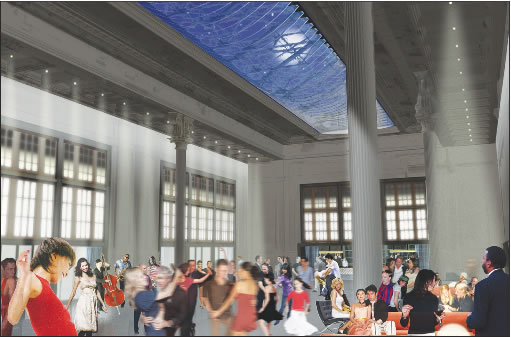By Julie Shapiro
Borough President Scott Stringer got new concessions from the developers of the Battery Maritime Building last month in exchange for his approval of their plan.
Developer Dermot Company agreed that the Great Hall on the second floor of the building will be open to the public for arts uses weekdays from 9 a.m. to 5 p.m., alternating weekends and several evenings a month. The rest of the time it will be closed for private revenue-generating parties and events.
“That sounds like a fair compromise,” said Ro Sheffe, chairperson of Community Board 1’s Financial District Committee. “I think we’d all prefer to have it be a completely public space full-time, but we’re realistic about it — it has to be self-supporting financially.”
Dermot and the Poulakakos family are hoping to refurbish the historic Battery Maritime Building near the Staten Island ferry terminal and top it with a restaurant and glassy 150-room hotel. The developers would renovate the 9,200-square-foot Great Hall on the building’s second floor to create a space similar to the World Financial Center Winter Garden.
The $150 million project for the Governors Island ferry terminal building is not definite, particularly with the economic downturn. Dermot told Downtown Express in May that the company would seek private financing in early 2009 if the markets improved, but Dermot did not return calls for comment last week.
Peter Poulakakos, whose family owns several nearby restaurants including Harry’s Café, deferred questions on the financing to Dermot, saying, “We’re all working on it very aggressively. We’re still very, very much…excited about it.”
The project is making more clear progress through the city approval process, with the community board and borough president both adding their support. The City Planning Commission heard testimony on the project last week and has until March 2 to rule, and then the City Council will have 50 days to act, said Jennifer Torres, a City Planning spokesperson.
Initial ideas for the Great Hall included a fresh food market and a food court, but because of the difficulty of getting to the building near the F.D.R. Drive, the developers decided to focus on arts uses instead.
“It’s going to allow a lot of local artists and smaller artists to come in and express their work,” Poulakakos said. “It’s a great way to link the public and private use.”
After discussions with the community board in November, Dermot agreed to hire a full-time cultural coordinator to book performers for the space. All the public events will be free and Dermot will not charge the artists to use the space, including a stage with sound and lighting systems. The space will have at least 150 seats.
Dermot also agreed to come back to the community board each year to get feedback.
“That’s the first I’ve heard of that,” said Sheffe, the Financial District Committee chairperson. “Thank you, Mr. Stringer.”
Stringer’s agreement with Dermot will eventually be incorporated into the city’s long-term lease of the land to Dermot, giving the city the ability to enforce it.
Sheffe hopes the public performances will draw enough people to the Battery Maritime Building that Dermot will decide to expand the Great Hall’s public hours.
“It has a lot of potential to be a real cultural jewel for the Financial District,” Sheffe said. “Once it hits its stride and becomes popular, maybe they will decide to revisit it.”
Julie@DowntownExpress.com

































